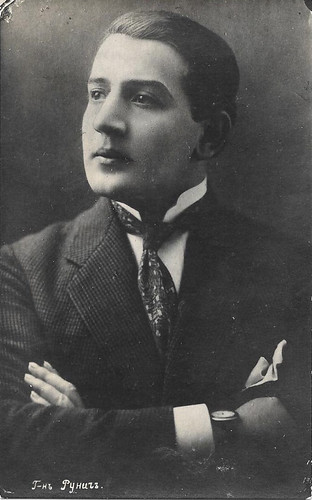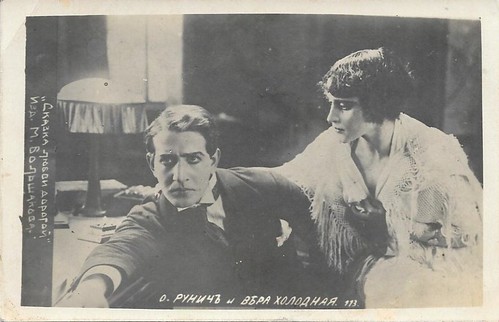
Russian postcard. Collection: Didier Hanson.

Russian postcard, no. 75. Collection: Didier Hanson. Publicity still for Posledneiye tango/Last Tango (Vyacheslav Viskovsky, 1918) with Vera Kholodnaya.
Last tango
Ossip (or Osip) Runitsch was born as Osip Fradkin in Saint-Petersburg, the Russian Empire in 1889, according to Wikipedia. IMDb gives as his birth name Osip Ivanovich Runich.
He started his acting career on stage and worked for the Moscow Art Theatre and the Hermitage Theatre in Saint-Petersburg.
In 1915-1919 he starred in some successful silent films of that time, such as the historical drama Voyna i mir/War and Peace (Vladimir Gardin, Yakov Protazanov, 1915) with Vera Karalli, and Pesn torzhestvuyushchey lyubvi/Song of Triumphant Love(Yevgeni Bauer, 1915) with Vera Kholodnaya.
He co-starred again with Kholodnaya in the circus drama Molchi, grust... molchi/Be silent, sorrow ... be silent (Pyotr Chardynin, 1918), and Posledneiye tango/Last tango (Vyacheslav Viskovsky, 1918).
According to Wikipedia, Runitsch was a long-time admirer of the beautiful Vera Kholodnaya and was devastated after her early death in 1919.
During the Russian Civil War, Ossip Runitsch thus fled Russia. He lived for a while in Riga, Latvia, where he played in the troupe of Russian Drama Theatre.
Then he left for Italy. Credited as Giuseppe Runitsch, he took part in a number of Italian films, including L'orchidea fatale/The fatal orchid (Alessandro Rosenfeld, Aleksandr Uralsky, 1920) and L'automobile errante/The wandering car (Arturo Ambrosio Jr., Achille Consalvi, 1921).

Russian postcard, no. 132. Collection: Didier Hanson. Publicity still for Posledneiye tango/Last Tango (Vyacheslav Viskovsky, 1918) with Vera Kholodnaya. Only about 10 minutes of this film are known to exist. The rest of the film is believed lost.

Russian postcard, no. 146. Collection: Didier Hanson. Publicity still for Posledneiye tango/Last Tango (Vyacheslav Viskovsky, 1918) with Vera Kholodnaya.

Ossip Runitsch and Vera Kholodnaya. Russian postcard, no. 125. Collection: Didier Hanson.
Playing with Fire
In 1921, Ossip Runitsch moved on to Berlin, then the burgeoning film capital of Europe.
In Germany he co-starred as Camille Desmoulins in the silent historical film Danton (Dimitri Buchowetzki, 1921) opposite Emil Jannings as Danton and Werner Krauss as Robespierre. The film was based on the play Danton's Death by Georg Büchner.
Interesting was also the silent comedy-drama Das Spiel mit dem Feuer/Playing with Fire (Georg Kroll, Robert Wiene, 1921). Diana Karenne starred as a method actress, who likes living out the roles she is playing in real life. To prepare for her new play, she enters the criminal underworld and ends up being implicated in a burglary of a Duke who is one of her suitors.
Runitsch also worked with director Robert Wiene on Der Puppenmacher von Kiang-Ning/The Doll Maker of Kiang-Ning (Robert Wiene, 1923) with Werner Krauss as a doll maker in China who crafts a puppet which he is convinced is lifelike.
In 1925 Runitsch married Nina Pavlishcheva, a ballet dancer. They often worked in Paris, where Runitsch worked on Russian emigrant stage productions, plays but ballets and operas as well. He also taught at a Russian theatre academy in Paris.
One of his last silent films was the German drama Tagebuch einer Kokotte/Diary of a Coquette (Constantin J. David, 1929) starring Fee Malten. A year later, sound and his accent finished his film career.
In 1933, he and his wife accepted an invitation to tour South Africa from local Jewish friends. They stayed in South Africa and Runitsch became a founder of one of the first professional theatre companies in a country, the Johannesburg Studio. Besides, he produced operas for the State Theatre in mid-1940s.
Ossip Runitsch died in 1947 in Johannesburg, South Africa.

Ossip Runitsch and Vera Kholodnaya. Russian postcard, no. 30. Collection: Didier Hanson.

Russian postcard, no. 30. Publicity still for Molchi, grust... molchi/Be silent, sorrow ... be silent (Pyotr Chardynin, 1918) with Vera Kholodnaya. Collection: Didier Hanson.

A Who is Who of the Russian silent cinema. In a circle from left: actor Vladimir Maksimov (with bear), actress Vera Kholodnaya, actor Vitold Polonsky, actor Ivan Khudoleyev, actor Ivan Mozzhukhin, actor-director Pyotr Chardynin and Ossip Runitsch. Russian postcard, no. 108. Collection: Didier Hanson.
Sources: Wikipedia (German and English) and IMDb.
No comments:
Post a Comment